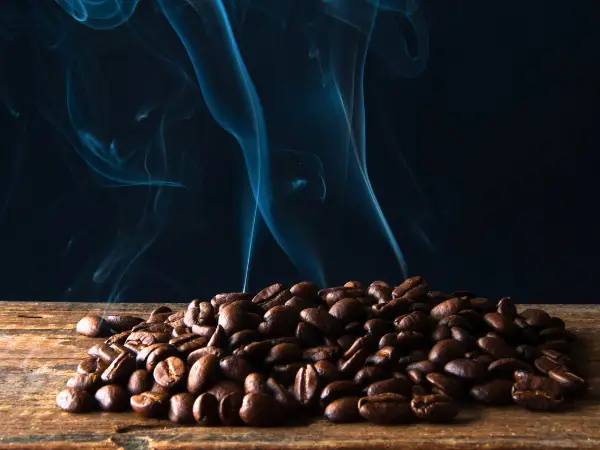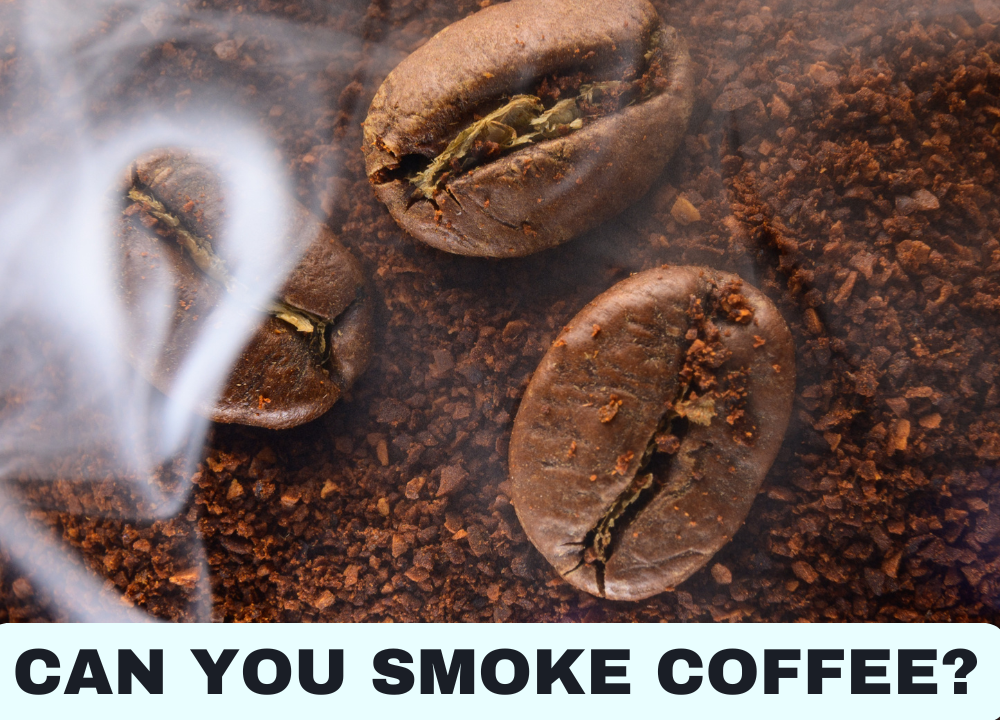This unusual method of consuming coffee raises many questions about safety and health effects. As coffee lovers seek new ways to enjoy their favorite beverage, smoking coffee has gained attention.
The smoke can contain harmful substances, and inhaling it may lead to health issues. Understanding the risks and effects of smoking coffee is essential.
What Happens When You Smoke Coffee?
This section explores the chemical changes, caffeine levels, and physical reactions related to smoking coffee.
The Chemical Composition Of Coffee Smoke
When coffee is burned, it creates a unique smoke. This smoke contains various chemicals. Key components include:
- Caffeine
- Chlorogenic acids
- Oils
However, burning coffee changes its chemical makeup. It produces carbon monoxide and other harmful compounds. These can be dangerous to health.
Here’s a quick look at the chemical composition of coffee smoke:
| Component | Effects |
|---|---|
| Caffeine | Stimulant, but poorly absorbed through smoke |
| Chlorogenic acids | Antioxidants, but altered when burned |
| Carbon monoxide | Harmful gas affecting oxygen levels |
Although coffee contains caffeine, smoking it does not provide the same benefits. The body does not absorb caffeine efficiently through smoke.
Does Smoking Coffee Provide A Caffeine Boost?
Many people enjoy caffeine for its stimulating effects. However, smoking coffee does not offer the same caffeine boost as drinking it. The body absorbs caffeine differently through smoke.
When smoking coffee, the caffeine levels are much lower. Some factors include:
- Burning coffee alters its chemical structure.
- Caffeine is not efficiently absorbed through smoke.
- Users may experience only mild effects.
Studies show that the caffeine from smoked coffee provides minimal stimulation. Regular coffee drinkers may find the effects disappointing. Overall, smoking coffee does not deliver the expected caffeine boost.

Immediate Sensations And Physical Reactions
Smoking coffee leads to various immediate sensations. The experience can be quite different from drinking coffee.
Common physical reactions include:
- Harsh taste – The flavor can be very strong and unpleasant.
- Throat irritation – Smoke can cause discomfort in the throat.
- Dizziness – Some users report feeling lightheaded.
- Nausea – Inhaling smoke may lead to feelings of sickness.
These reactions occur due to the harmful compounds in the smoke. Unlike drinking coffee, smoking it can be harsh on the body. People should be cautious of these effects.
The Health Risks Of Smoking Coffee
Understanding risks is crucial before trying it. The health risks of smoking coffee can range from respiratory problems to potential toxicity.
Respiratory Dangers Of Inhaling Burnt Coffee
Inhaling burnt coffee can cause significant respiratory issues. The smoke produced contains harmful substances. These can irritate the lungs and lead to coughing. Some of the respiratory dangers include:
- Can cause lung irritation and coughing.
- Risk of inhaling harmful chemicals from burnt coffee.
- Increased risk of respiratory infections.
Research shows that the combustion of organic material creates toxic compounds. These compounds can damage lung tissue. Regular exposure can lead to chronic conditions. The table below summarizes the potential respiratory effects:
| Effect | Description |
|---|---|
| Lung Irritation | Inflammation and discomfort in the respiratory system. |
| Coughing | Persistent cough due to lung irritation. |
| Respiratory Infections | Higher likelihood of infections from weakened lung function. |
Overall, smoking coffee poses serious respiratory dangers. The risks far outweigh any perceived benefits.
Potential Toxicity And Side Effects
Smoking coffee can lead to various toxic effects. The process of burning coffee beans releases harmful chemicals. These chemicals include acrylamide and polycyclic aromatic hydrocarbons. Inhaling these can cause health issues. Here are some potential side effects:
- Can lead to headaches and nausea.
- No proven health benefits – only risks.
- Increased toxicity from burnt compounds.
Inhalation of burnt coffee smoke can also result in:
- Throat irritation
- Increased heart rate
- Gastrointestinal distress
The absence of nicotine or addictive compounds makes smoking coffee different from tobacco. However, the harmful effects remain significant. For anyone considering this practice, awareness of potential toxicity is vital.

Comparisons To Smoking Tobacco Or Other Substances
When comparing smoking coffee to tobacco, important differences appear. Tobacco contains nicotine, which is addictive. Coffee lacks this compound. However, smoking coffee is still harmful. It is more harmful than drinking coffee but less harmful than tobacco.
Here are some key points of comparison:
- Tobacco: Contains nicotine; highly addictive.
- Coffee: No nicotine; no addictive compounds like in cigarettes.
- Health Risks: Smoking coffee can cause lung irritation, while tobacco increases cancer risk.
Understanding these comparisons helps clarify the risks involved. Smoking coffee is not a safer alternative to tobacco. The health risks remain significant.
Does Smoking Coffee Get You High?
This guide explores the risks and effects of smoking coffee. It also addresses common myths and the psychological aspects of this unusual practice.
Can You Feel A Buzz From Coffee Smoke?
Smoking coffee does not provide a buzz like traditional smoking methods. People often expect a quick energy boost. However, this expectation is misleading. There is no scientific evidence supporting benefits from smoking coffee.
When people smoke coffee, they inhale the smoke from roasted beans. This may lead to a few sensations, but these do not equal a caffeine buzz. Here are some key points:
- Coffee has caffeine, which is a stimulant.
- Smoking coffee does not release caffeine effectively.
- The body absorbs caffeine through digestion, not inhalation.
To illustrate the difference, consider the following table:
| Method | Caffeine Absorption | Expected Buzz |
|---|---|---|
| Drinking Coffee | High | Strong |
| Smoking Coffee | Minimal | None |
In summary, smoking coffee does not provide a noticeable buzz. Many people may feel a slight effect, but it is mostly psychological.
Myths Vs. Reality: The Truth About Coffee Smoking
Many myths surround the idea of smoking coffee. Some claim it can boost energy or provide a high. These beliefs often come from exaggerated stories on the internet. The reality is much different. Here are a few common myths:
- Myth: Smoking coffee gives a strong buzz.
- Myth: It has health benefits.
- Myth: Coffee smoke is safer than tobacco.
The truth is clear. There is no real psychoactive effect from coffee smoke. Studies show that caffeine must enter the bloodstream through digestion. Smoking coffee does not achieve this. As a result, there is no significant stimulant effect.
Psychological And Placebo Effects
The mind plays a powerful role in our experiences. The expectation of feeling energized can create a sense of alertness. This phenomenon is known as the placebo effect. Many users may report feeling more awake after smoking coffee, even without real stimulation.
Here are some factors to consider:
- Belief in the effects can influence feelings.
- Users may associate the act of smoking with relaxation.
- Past experiences with caffeine may shape perceptions.
People often seek new ways to enjoy coffee. Smoking may seem like an exciting alternative. The anticipation of benefits leads to the belief that smoking coffee works. Yet, it’s important to understand the placebo effect may contribute to perceived energy boost.
Alternative Ways To Enjoy Coffee For Stimulation
While smoking coffee may sound interesting, it is important to consider safer and more effective methods to enjoy caffeine.
Traditional Coffee Consumption Vs. Smoking
Traditional coffee consumption involves brewing and enjoying a warm cup. This method allows you to absorb beneficial compounds found in coffee. Smoking coffee, however, destroys these compounds.
Here are some key differences between drinking and smoking coffee:
- Absorption: Drinking coffee allows caffeine to enter the bloodstream through the stomach.
- Health Risks: Smoking can damage your lungs and lead to other health issues.
- Flavor: Traditional coffee offers a rich and complex flavor profile.
Overall, traditional coffee consumption remains the best way to enjoy coffee safely.
Caffeine Inhalers And Other Alternatives
For those seeking different ways to enjoy caffeine, several alternatives exist. Caffeine inhalers provide controlled doses without harmful smoke. These inhalers allow users to inhale caffeine safely. They deliver a quick boost without the risks associated with smoking.
Other options include:
- Energy Drinks: These drinks contain caffeine and other stimulating ingredients.
- Caffeine Gum: Chewing gum with caffeine offers a discreet way to get your dose.
- Vape Products: Some vape products mimic coffee flavor, but they lack widespread use.
Choosing the right method for caffeine intake is important for your health. Many options are safer than smoking coffee.

